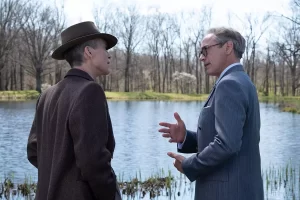I’ve finished reading Harry Potter and the Deathly Hallows last night (there are spoilers in this post; select the text to see them).
I dare say that it’s the best of the seven books in the series. J. K. Rowling was able to fit everything together in a nice way and, most importantly, adding new elements only when necessary – mostly everything that solved the mystery was already in the previous books. It was also pretty good to see Dumbledore as a human being, who has made a lot of mistakes in life (like the friendship with Grindelwald and his search of the Deathly Hallows), as opposed to the perfect picture everyone had of him before.
It’s a dark, captivating story. I could barely stop reading at all from the moment I started. I believe these characteristics of the book emanate primarily from the sensation of constant pursuit – there’s hardly a moment of peace for Harry, Hermione and Ron. Also, the many deaths of well known characters make the reader want to keep going to see what’s the outcome. The deaths of Mad-Eye Moody in the beginning and of Fred, Lupin and Tonks near the end are particularly shocking. Also, when a friend told me that Voldemort killed Harry and then Harry killed Voldemort, I was curious – I expected the fact to have something to do with that mirror from the first book and with that portal thing Sirius fell into, but the way it happens is way better – it seems the kind of stuff I’d come up with.
Anyway, I’m not particularly good at writing book reviews, so I’ll stop here. There’s only one more thing I’d like to say, and it’s that I liked very much the outcome of the story. Mostly it’s because it’s pretty much what I would have done – J. K. Rowling’s style pleased me very much because it’s very similar to my own. I like to use several elements already present in the story to build the end – it’s the best way to do it, because I see a story as a group of such elements whose purpose it just that: build the end of the story. The end of a story is the purpose of the whole thing, because it is what carries its true meaning.







Leave a Reply